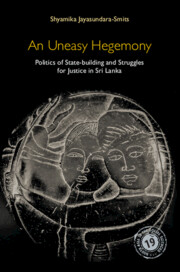Book contents
- Frontmatter
- Dedication
- Contents
- List of Tables and Figure
- Preface
- Acknowledgements
- List of Abbreviations
- 1 Introduction
- 2 Politics of Judgement
- 3 From Nationalism to Ethnic Supremacy
- 4 Political Patronage: Underbelly of Everyday Politics
- 5 State Institutions and Patronage Politics
- 6 War and Peace as Politics by Other Means
- 7 What Came after War?
- Afterword
- Appendix 1 Map of Sri Lanka
- Appendix 2 Indication of Background of Key Interviewees (from January to May 2009)
- Bibliography
- Index
5 - State Institutions and Patronage Politics
Published online by Cambridge University Press: 29 July 2022
- Frontmatter
- Dedication
- Contents
- List of Tables and Figure
- Preface
- Acknowledgements
- List of Abbreviations
- 1 Introduction
- 2 Politics of Judgement
- 3 From Nationalism to Ethnic Supremacy
- 4 Political Patronage: Underbelly of Everyday Politics
- 5 State Institutions and Patronage Politics
- 6 War and Peace as Politics by Other Means
- 7 What Came after War?
- Afterword
- Appendix 1 Map of Sri Lanka
- Appendix 2 Indication of Background of Key Interviewees (from January to May 2009)
- Bibliography
- Index
Summary
Politics in Sri Lanka has been described as a ‘consuming passion’, but a passion that may boil down to no more than the question of ‘who will be employed by the Ceylon Transport Board as the bus conductor’.
—Jupp quoted in McCourt (2007b: 433)Institutions play a central role in constraining behaviour and shaping preferences, goals and strategies, and even identities (Waldner 1999: 19). Where mass incorporation into politics happens before or simultaneously with the elaboration of a national administrative system, that system is likely to be based on patronage politics and patronage appointments (Waldner 1999: 24). The case of Sri Lanka provides some compelling evidence for this suggestion. It shows how important linkages can be made between intra-elite conflicts, timing of mass incorporation of lower classes into nation politics and paths of state-building (Waldner 1999). Such interconnected elements have encouraged the ruling elites to (ab)use state institutions for purposes of political patronage. In general, state institutions play a direct role in enabling political elites to act as intermediaries between the state, the economy and society (Waldner 1999: 24). The example of Sri Lanka shows institutional changes introduced to the state apparatus being closely tied to or even completely aligned to financing an institutionalised form of patronage system to pursue faction-ridden ruling elites’ hegemony-building project.
Critiques of the functioning of state institutions often point to their inefficiency in delivering basic public services, their uncontrolled expansion and the mammoth maintenance costs of public bureaucracies (Hulme and Sandaratne 1996; Samaratunga and Bennington 2002: 87; De Alwis 2009). Similar to observations in the World Development Report (Evans and Rauch 1999: 748), there are numerous works on Sri Lanka that identify politicisation and widespread patronage politics as a worrisome development across state institutions (Ranugge 2000: 51; IDEA 2007; De Alwis 2009: 57). Important work on patronage politics in state institutions links this phenomenon with ethnic conflicts and civil war (Thiruchelvam 1984c; Uyangoda 1994; Wilson 1979; DeVotta 2002; Shastri 1990). Reciprocally, studies have shown how state institutional transformations can impact inter-ethnic relations adversely (Thiruchelvam 1984b: 185–95; Mathews 1986: 33; Thangarajah 2000: 127; DeVotta 2005: 145–47).
From the particular perspective of hegemony-building, this chapter shows how institutionalisation of patronage politics across state institution was invented by Sinhalese ruling elites as a permanent guarantor for financing the party-based patronage system, for political mobilisation and elite instrumental coalition-building strategies against a backdrop of dwindling state accumulation.
- Type
- Chapter
- Information
- An Uneasy HegemonyPolitics of State-building and Struggles for Justice in Sri Lanka, pp. 173 - 222Publisher: Cambridge University PressPrint publication year: 2022



